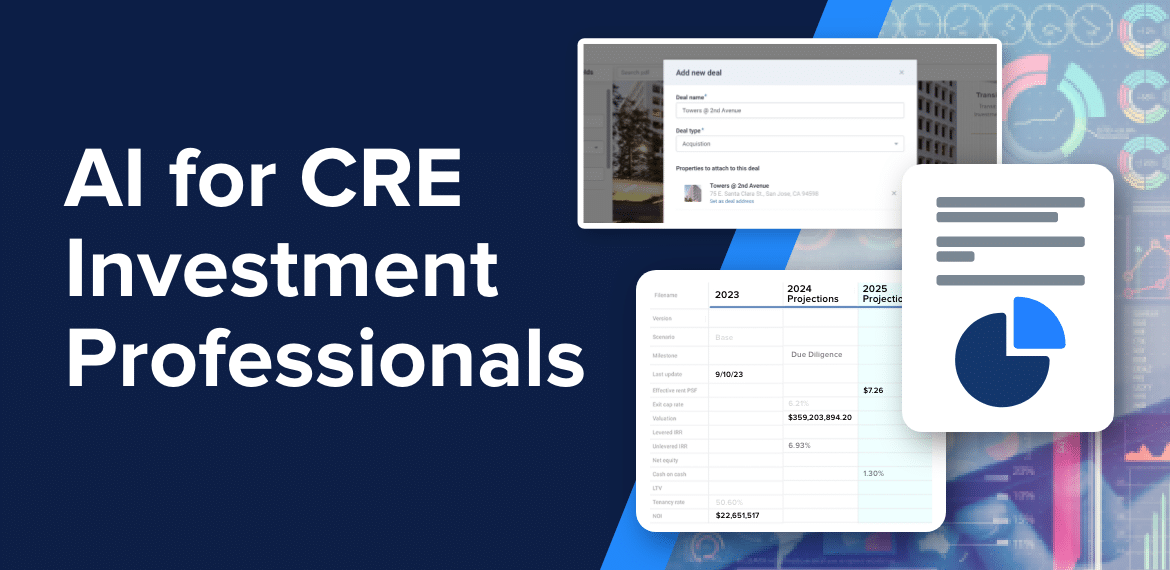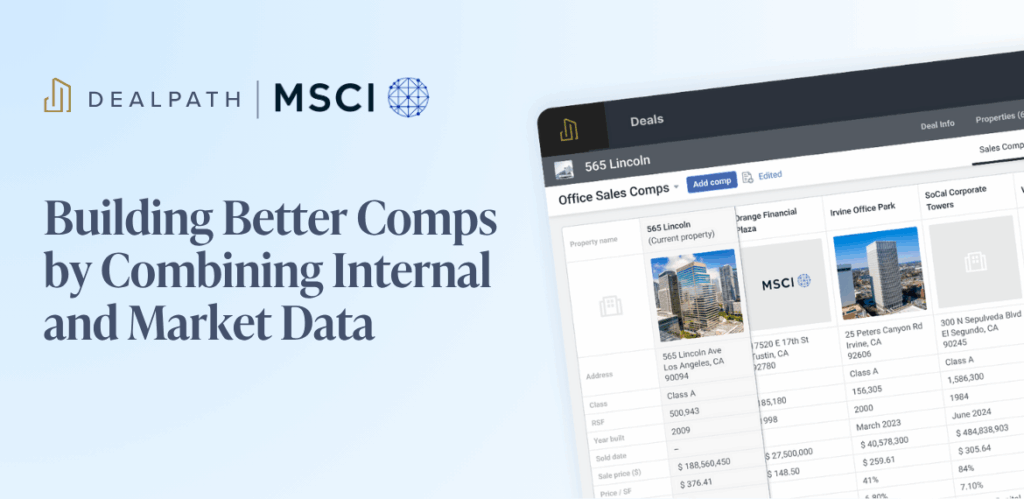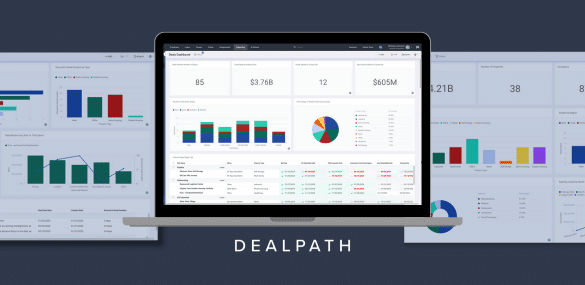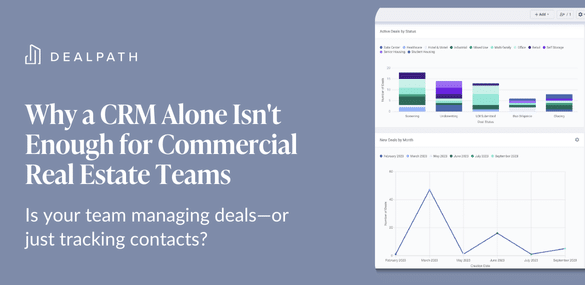The new world of artificial intelligence in real estate can feel like an ever-growing maze, with new tools emerging every day. It’s clear that AI will revolutionize the way business is done, but it’s unclear as of yet exactly how.
From scaling data analyses to automating simple work to predicting performance, the possibilities are endless. But where should CRE investment management professionals even start?
In this blog post, we’ll review five simple tips that you can leverage AI as part of your day-to-day workflow, as well as relevant tools and helpful prompts to get you started.
1. Extract Property or Lease Data With ChatGPT
Tool: ChatGPT Plus
Goal: Reduce time spent on data extraction
Sample Prompt: Extract property metrics, tenant names, and lease expiration dates into a table
For many professionals, one of the simplest and most effective AI use cases is reducing friction when it comes to data analysis. Streamlining these manual stages creates more bandwidth to prioritize impactful work.
ChatGPT Plus can be used for extracting key property details from documents. You can upload offering memorandums, lease agreements, appraisal reports or another document with data you need. Then, enter a simple prompt like “Extract property metrics, tenant names, and lease expiration dates into a table.”
ChatGPT will generate a table containing all of this information, saving you hours that you can allocate to deeper analyses.
To learn how to extract deal data directly into your deal pipeline and build a proprietary deal database with AI-powered Dealpath Data Ingestion, schedule a meeting.
2. Summarize Document Reviews During Due Diligence
Tool: ChatGPT Plus and Google Gemini
Goal: Surface most important information from diligence
Sample Prompt: Create a bulleted summary of key risks, dates, and how they will be mitigated
No matter the deal’s complexity, sifting through mountains of due diligence documents to find what you need quickly becomes a time-consuming nightmare. Instead, rely on AI to summarize key information from diligence findings.
ChatGPT and Gemini can generate summaries of documents such as environmental reports, financial statements, legal contracts and more documents to highlight key points–which might otherwise take hours to find. After uploading the document, submit a prompt like “Create a bulleted summary of key risks, dates, and how they will be mitigated”.
Consequently, you can find the information you need without disrupting your workflow. Before acting on these summaries, though, be sure to validate the underlying facts within the documents.
3. Craft Investment Committee Memos With Quillbot AI
Tool: Quillbot AI
Goal: Draft investment committee memos
Sample Prompt: No prompt required
While only a skilled professional is equipped to pitch a deal to the investment committee, AI may be able to play a role in packaging compelling arguments.
Quillbot AI is a tool that can elevate investment committee memos, helping your team make the strongest case possible for any given deal. With only an investment thesis, Quillbot can paraphrase existing copy, suggest revisions and generate summaries.
After editing Quillbot AI’s output, you’ll be on your way to delivering a winning pitch to the investment committee.
To learn more about how to automate collateral creation based on centralized data in Dealpath, click here.
4. Analyze Markets With Google Gemini
Tool: Google Gemini
Goal: Identify recent market trends
Sample Prompt: Provide an analysis of the current market conditions for commercial real estate in the area surrounding the property. Include data on supply and demand, average rental rates, occupancy rates, and any trends in the market.
Your proprietary deal database may be the ultimate tool for market analysis, but AI can also aid in surfacing recent trends that may impact your decisions or priorities.
Somewhat overshadowed by ChatGPT, Google’s Gemini is another powerful generative tool that, notably, can interpret real-time information. For CRE professionals, one use case to consider is relying on this tool to analyze changing markets, trends, news, and data in specific geographies alongside proprietary information.
Whether you need a quick overview of retail vacancy rates in the San Francisco Bay area or a summary of CBRE’s North America data center trends report, Bard can help you factor current events into market analyses.
To learn how investors surface market trends based on proprietary data in Dealpath, click here.
5. Always Specify a Persona
Tool: All
Goal: Ensure the AI understands the goal of the task and adopts the correct lens
Sample Prompt: You are an analyst at a CRE investment management firm
In many ways, AI tools are fulfilling the role of a member of your team. Across all your pursuits with generative AI, one helpful tip to ensure the AI can execute your exact requirements is to define its persona.
Instructing the AI to take on a specific role within a CRE organization empowers the AI to better tailor its response to your needs. For example, when underwriting, you might instruct the AI to be an acquisition analyst. Or, in the case that you’re writing a summary of recent loans for investors, you can tell the AI to take on the role of Loan Originator.
Consequently, the AI will be able to adopt that unique lens to best execute on your requests.
What Does the Future of AI in CRE Look Like?
For real estate investment professionals, these recent developments are only the beginning of AI-driven disruption.
While delivering powerful capabilities at scale, AI is still a relatively new technology that carries inherent risks related to data rights, accuracy, data privacy, and other considerations. Before implementing AI tools across your organization, be sure to consider risk mitigation strategies.
The reports, insights and text generated by AI can only be as strong and compelling as the underlying inputs. If dirty data is clouding your digital systems, then reports and insights could result in costly, preventable errors.
As you scale your AI strategy, prioritize trusted, proven software adopted by leading institutions to drive your investment strategies in the rapidly evolving digital age.
How to Evaluate AI for Real Estate Investment Management
With just a few strategically written prompts in your toolkit, you can leverage AI to extract data, draft memos and pace ahead of market trends, all while maximizing efficiency.
As investor expectations for data-driven decision making and team efficiency rise, though, firms with purpose-built AI technology will be best positioned to outperform the competition.
Download our white paper to gain practical, actionable insight into how your firm can evaluate AI-powered technologies to build operational efficiencies and enhance data-driven precision.
Download Now


